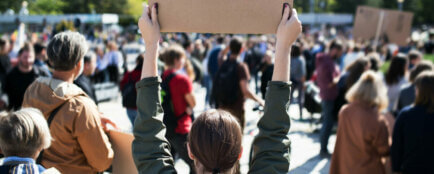Human dignity – definition
Human dignity is not an officially enshrined concept and can be viewed from several perspectives. In Western philosophy, it is understood mainly as a consequence of human rationality and freedom. In international law, human dignity is recognised as a fundamental value and a starting point for human rights.
In general, it could be said that human dignity is a value attributed to each person solely on the basis of his or her human existence. It expresses the inalienable, inherent and universal value of the individual, which is not conditioned by his or her ability, status or social recognition.
The history of human dignity
The concept of human dignity has a long history. Originally, it appeared more in the context of philosophy and religion, where it was associated with the idea that every person has some inherent value and inviolability. In the Middle Ages, the concept then developed in the context of Christian theology, where dignity is associated with the image of God in man.
The modern concept of human dignity became more established during the Enlightenment and during the 18th and 19th centuries, when it began to be introduced more into legal texts and declarations. For example, the American Declaration of Independence of 1776 established that all men are created equal and have inalienable rights, including the right to life, liberty, and the pursuit of happiness. The French Revolution brought the Declaration of the Rights of Man and of the Citizen (1789), which also emphasized the dignity and rights of the individual.
After the Second World War, the concept of human dignity became central to international law, particularly in the UN Declaration of Human Rights (1948).
Are you solving a similar problem?
Do you need help?
Has your dignity or other fundamental human rights been violated? Tell us about your experience and we’ll know within 24 hours.
I want to help
- When you order, you know what you will get and how much it will cost.
- We handle everything online or in person at one of our 6 offices.
- We handle 8 out of 10 requests within 2 working days.
- We have specialists for every field of law.
Which laws protect human dignity
Human dignity is regulated by a number of international and European treaties, but it can also be found in our laws:
- The UN Universal Declaration of Human Rights (1948): right at the beginning we find a statement saying that “… recognition of the inherent dignity and of the equal and inalienable rights of the members of the human family is the foundation of freedom, justice and peace in the world,…”. Article 1 then states that “All human beings are born free and equal in dignity and rights.“
- The Charter of Fundamental Rights of the European Union (2000): states that “Human dignity is inviolable. It must be respected and protected.” More specifically, it sets out the right of older persons to lead a life of dignity and independence. It also states that “Every worker has the right to working conditions that respect his or her health, safety and dignity.”
- Charter of Fundamental Rights and Freedoms (1993): our most important human rights law states that “People are free and equal in dignity and rights.” and that “Everyone has the right to have his human dignity, personal honour, reputation and name preserved.”
But we also find regulation of human dignity, for example, in the Civil Code, which says that private law rests on the principles that “everyone has the right to the protection of his life and health, as well as his liberty, honor, dignity and privacy.” Human dignity is also specifically protected by the Criminal Code, the Labour Code or the Anti-Discrimination Act.
How dignity can be violated
A violation of human dignity can occur in many cases. In particular, people are at risk if they are restricted in some way which makes the boundaries of their dignity less clear than for others. This includes, in particular, the elderly, the sick and disabled, children, as well as people who are restricted in their personal freedom.
Let us now look at each case in more detail:
Dignity in old age
Old age is often perceived by society as a period of decline, infirmity and dependence, which leads to older people becoming “invisible”. In addition, with age comes a loss of self-sufficiency (e.g. problems with movement, vision, hearing, memory) which often leads to older people being unable to live without the assistance of another person.
This assistance can often lead to violations of dignity, even unintentionally. Indeed, caregivers or family members may take control of the elderly person’s life out of ‘good intentions’, without respecting his or her wishes, and the elderly person cannot effectively defend him or herself.
Problematic behaviour is particularly likely to be encountered in homes for the elderly, where understaffing and overwork can lead to dehumanising treatment. Elderly people may suffer, for example, from a lack of privacy (e.g. unannounced staff entering the room without knocking) and not being able to fully decide what to do (e.g. fixed waking, eating, sleeping times). Addressing seniors with diminutives or infantile tones (“grandma”, “grandpa”, “come on, sweetheart”) is also problematic.
Dignity in illness
Sick people tend to be deprived of their dignity for reasons related to their vulnerability, dependence on others and systemic deficiencies in the health care system.
In the first place, it is not uncommon for doctors and other health professionals to treat patients impersonally, mechanically and without taking enough time to explain diagnosis and treatment. Patients often learn of serious diagnoses in an unemotional way or are not sufficiently informed about treatment options. The fault often lies not with the doctors, but with the fact that they are overworked and simply do not have the time.
Another problem is that patients are often subjected to situations where they are examined in full view of other patients or in insufficient privacy. It also happens that the patient’s health condition is discussed in public, which can be embarrassing for the patient.
Dignity of disabled people
People with disabilities are often considered weak, incapable or unable to lead a ‘normal’ life. Moreover, these people are often defined primarily by their disability. Violations of dignity can then occur both intentionally (discrimination, abuse) and unintentionally (overprotection, deprivation of autonomy).
These people may be deprived of their autonomy without this being strictly necessary. Often other people make decisions for them and do not consult them about their own needs. Their sexual needs are tabooed and they are not allowed to have relationships or start families.
In nursing or assisted living facilities (like care homes), there can be insensitivity to hygiene tasks (e.g. help with bathing without regard to shame). Here too, there is often a lack of empathy and time to give the patient the care they need.
Tip for article
What is autonomy and what are the consequences of limiting it? Find out in the next article.
Dignity of children
Children are one of the most vulnerable groups because they are dependent on adults who have the power to make decisions about their lives. While they need nurturing, they also deserve to have their dignity preserved, which does not work in many families.
Violations of their dignity may be deliberate, for example in the form of physical and psychological violence. It is not uncommon for many people to beat or verbally humiliate and ridicule their children.
But violations of dignity can also occur unconsciously – typical examples include undermining children’s views and violating their privacy, for example by parents not knocking before entering their rooms or posting their photos on the internet without their consent.
Dignity of persons deprived of their personal liberty
Persons deprived of their personal liberty (prisoners, persons in detention, etc.) are particularly vulnerable to violations of their dignity. This is mainly due to their weakened legal status, institutional control and social prejudices.
Persons deprived of their liberty are under the full control of the State, which means that they cannot easily protect their rights. Moreover, prison staff sometimes abuse their position. Limited opportunities to communicate with the outside world can then lead to possible abuses remaining hidden. Moreover, a large part of the public perceives the poor conditions in prison (or similar institutions) as deserved and fair.
Tip for article
We have discussedimprisonment in detail in our next article.
Consequences of not respecting human dignity
One of the most visible consequences of a violation of dignity is psychological harm. People who are subjected to long-term humiliation or insensitive treatment often lose their self-esteem and sense of self-worth. This can then lead to the development of psychological illnesses such as anxiety disorders, depression or post-traumatic stress disorder.
Disrespect for dignity also has a direct impact on interpersonal relationships and the social climate in society. People who have been humiliated for a long time lose trust in others and often retreat into isolation. On a larger scale, disrespect for dignity leads to widening inequalities and the creation of social groups that feel excluded from society. In societies where dignity is systematically violated, radicalisation and extremism even increase.
How to defend your dignity?
In some less serious cases, for example, a complaint may be sufficient to address the issue. In more serious cases, such as bullying, discrimination or inappropriate treatment by the authorities, you can turn to the Ombudsman or the courts.
If it is a criminal offence, you can file a criminal complaint. If you are not sure how to proceed, we recommend consulting a lawyer to help you decide what to do.
Tip for article
Find out more about how to protect your basic human rights in our article.
Summary
Human dignity has historically been associated with philosophy and religion and has gradually become a key value of human rights, enshrined in the UN Universal Declaration of Human Rights, the EU Charter of Fundamental Rights and Czech legal norms.
Human dignity is a fundamental right of every human being, expressing his or her inalienable value regardless of ability or social status. Yet it is often violated, especially by the elderly, the sick, the disabled, children and persons deprived of their personal liberty. Problems include, for example, impersonal treatment, restriction of autonomy, invasion of privacy or discrimination.




